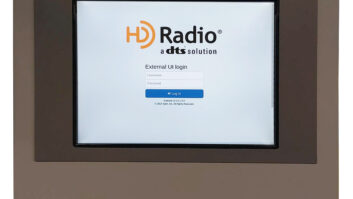The Author Argues That We Can Give Listeners the Option of Uncensored Digital or Censored Analog FM
With the Congress and the FCC on our case, fines and possible license revocation are a reality for stations that get nailed for saying naughty things. Most of us are just one Morning Zoo slip-up from trouble – and possibly three slip-ups from disaster. The crusade to stamp out broadcast obscenity seems to be reported more often in the financial section of the newspaper, an indication of where journalists think this story leads. If you weren’t scared before, you probably are now.
We also face a possible talent exodus, right into the waiting arms of XM and Sirius. And with them will go valuable listeners – listeners from the MTV generation who are likely to adopt new technology like satellite radio. High-profile, established air talent is just what XM and Sirius need to get a foothold.
The good news is that there is a technical solution to this problem. It is a one-size-fits-all idea, and requires minimal operational changes.
The solution I’m proposing would allow listeners to choose whether or not to hear edited (some might say censored) broadcasts. It’ll settle down the spooked air talent before they head for the door, and will solidify our place with the tech-savvy younger demos.
And this solution is already FCC-approved.
Heretofore
In case you were wondering how we got to this point …
From time to time, usually during contentious political periods in Washington, the content of broadcast media comes to the attention of the FCC and sometimes other parts of government. In the 1970s, the FCC was used as a police department by the White House, for Nixon and his aides felt that network news coverage was slanted and wanted to take action.
In one such instance, according to former CBS News reporter Bob Schieffer in his book “This Just In,” FCC Chairman Dean Burch personally called CBS, NBC and ABC demanding transcripts of news commentary aired after a Nixon speech. The intent was to intimidate, as the networks knew that the FCC had the power to revoke licenses.
After Nixon, the target moved from offensive news to offensive entertainment, with the focus on nudity on TV and dirty words on the radio. The FCC and the courts established in Miller vs. California (1973) that obscene material enjoys no First Amendment protection, and that local community standards would dictate what was considered obscene. We ended the 1970s with the famous FCC vs. Pacifica case about George Carlin’s monologue “Filthy Words” that aired in New York.
For the most part, the FCC took enforcement action only when the offensive material could be reproduced, either through playback of a recording or reading of a transcript. Throughout most of the 1980s and 1990s, the FCC required complaints to be accompanied by a tape or transcript before undertaking any investigation. Even today, the FCC’s Web site states:
“The Commission does not independently monitor broadcasts for indecent material. Its enforcement actions are based on documented complaints of indecent or obscene broadcasting received from the public. Given the sensitive nature of these cases, it is important that the Commission be afforded as full a record as possible to evaluate allegations of obscene or indecent programming.”
So, for those that have attributed this dust-up to election year political grandstanding, you are partly right.
Easy copies
I can remember working at stations in the 1980s that threw out their “logging” recorders – clunky old machines with names like Soundscriber. These devices were tossed because, in the absence of a recording and without a transcript, everything that was aired was deniable. Any station that kept a permanent record of what it broadcast risked having to produce a copy if demanded by the FCC.
Nowadays, almost every high-profile radio program should assume it is being recorded. John Garziglia, a lawyer with the Washington-based communications law firm Womble Carlyle, attributes part of our present dilemma to the Apple iPod and similar devices. Inexpensive, long-running digital recorders make it possible to easily archive multi-hour radio shows. Well-meaning fans post the most edgy clips on Web sites. A Google search of “Stern aircheck” yielded 224 hits. Even the stations’ Web sites make digital copies available.
Today, it is easier than ever to document an obscenity complaint with a verifiable recording right from the Internet. No matter what your feelings are about broadcast obscenity, the enforcement consequences are a serious problem that is here to stay.
Scrambled signals
Why can Howard Stern go to XM? Doesn’t XM use the airwaves?
Yes, and federal law (Title 18, Part 1, Chapter 71, Section 1464) prohibits broadcasting obscene material over XM.
It also prohibits obscene material on HBO. But HBO routinely shows uncut movies with R ratings. Such movies always contain enough senseless violence, nudity and offensive language to guarantee Hollywood a return on investment. Most would cross the “community standards” line for a community somewhere, and so would be deemed obscene. Yet these movies are seen nightly by a national audience. How?
The loophole seems to be that XM and HBO are transmitted as scrambled subscription services. Even though federal law (Title 18, Section 1468) includes an obscenity prohibition for subscription services, the “community standards” test doesn’t really make sense when the community of viewers paid to see the stuff. Politically, this seems unlikely to change. Even if congressmen can’t understand Arbitron ratings, their consultants can.
And attempts to censor where the audience fully expects obscene content have usually fallen flat, like Chicago’s WSNS(TV), which once aired adult videos that required a decoder for viewing. Cases involving rape videos or snuff films, such as were sold by Garry and Tamara Ragsdale before their 2003 conviction for mailing obscene material, were the exception. The key to avoiding trouble is to provide a path to “informed consent” on the part of the listener.
Unfortunately, our medium has no provision for “scrambling” the signal, like XM and HBO – at least not until now.
HD scramble
Many FM stations are in the process of implementing Ibiquity HD Radio, our FCC-approved digital radio technology. One of the necessary processes in the Ibiquity system is called interleaving, which is a kind of “scrambling” of the digital audio stream. Without the correct reciprocal unscrambling process at the listener end, the Ibiquity audio is unrecognizable.
Ibiquity requires that listeners buy a whole new radio, for the same reasons your old turntable won’t play a CD. And the radio will almost certainly allow the listener to disable the Ibiquity and listen to ordinary analog FM. The conscious decision on the part of the listener to switch on Ibiquity and listen to the digital audio represents consent.
Interestingly, the Ibiquity scrambling process takes time. Audio goes into the Ibiquity encoder and comes out seconds later. Because it is intended that the Ibiquity digital audio and the plain old FM arrive at the same time, a separate time delay must be applied to the analog FM to match the built-in delay of Ibiquity. Until now, this has been viewed as something of an inconvenience.
Meanwhile, broadcasters are responding to the obscenity concerns by installing profanity delay systems. By combining these two initiatives into one, Ibiquity can solve our obscenity problem.
Informed consent
What if the Ibiquity audio stream was branded as “uncensored and uncut,” and the existing analog FM signal was subject to profanity bleeps? By choosing to enable Ibiquity reception, the listener is granting informed consent. Cross-media promotion, such as outdoor and TV, should make clear that the Ibiquity digital stream is uncensored and uncut.
The mechanisms would be easy to implement and jocks could even “self-censor” using a button like the old cough switch right in the studio. If station management seeks a second level of control, another censor could control content using a traditional profanity delay. The key difference is that the program would remain uncensored for the Ibiquity stream.
For those stations wanting still another level of regulatory comfort, promotions involving retailers of Ibiquity receivers could include listener registration. By creating an impression that listeners must sign up for Ibiquity (even if the registration fee is “waived” or given to charity) those who do not register forfeit their right to complain, because the complaint will be about a service that has been “stolen.”
With such a solution, our listener, driving to an unsatisfying job and working for a jerk of a boss, will once again be able to enjoy living vicariously through the Howard Sterns of our medium. The listener will once again enjoy a chuckle thanks to clever but irreverent hosts who butcher the sacred cows of mainstream sensibility.
In an era when radio has been criticized for universal bland sameness, isn’t the commuter entitled to assert individual taste, and choose the desired flavor of escape from reality radio provides?











